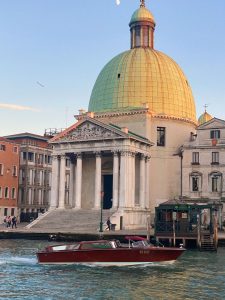 Ciao, mi chiamo Alex! I am currently studying BA Modern Languages: French and Spanish. I took Italian as an IWLP in my first year as an extra module. Originally, I thought I would study Russian or British Sign Language as I have always had an interest in these. I went to a few of the taster sessions and really enjoyed the Italian one and realised that it fit in well alongside my course as the languages are fairly similar.
Ciao, mi chiamo Alex! I am currently studying BA Modern Languages: French and Spanish. I took Italian as an IWLP in my first year as an extra module. Originally, I thought I would study Russian or British Sign Language as I have always had an interest in these. I went to a few of the taster sessions and really enjoyed the Italian one and realised that it fit in well alongside my course as the languages are fairly similar.
I have continued with Italian in my second year and am still enjoying the classes as well as making progress in my language learning. The classes are engaging, interactive and I really enjoy them. The coursework, the portfolio, is very flexible in that you can do it with others or on your own and the people you meet are on courses either similar or very different to your own, so you can meet a large variety of people. With the classes being so engaging I feel that the speed in which you learn the language is quite quick, and by the end of the year I was able to put sentences together and speak at a basic level, which was a fulfilling feeling. I think that the way in which the course is structured is helpful as it is less intense than if it were part of your degree.
The culture behind the language was one of the things which I found more interesting and through the portfolio I was able to touch on elements from the classes on a more profound level. Although I am learning an extra language, I found it manageable alongside my degree as the deadlines lined up and were very similar in nature. I feel that Italian will be useful in the future for me as I plan on working abroad, potentially in Italy, so I feel having begun to learn will only benefit me.



 n mistakes significantly lowered the amount of errors I made in the future speaking to Italians. In my portfolio I mainly focused on scenarios I would come across in Venice, e.g. conversations in restaurants, supermarkets and so on.
n mistakes significantly lowered the amount of errors I made in the future speaking to Italians. In my portfolio I mainly focused on scenarios I would come across in Venice, e.g. conversations in restaurants, supermarkets and so on.